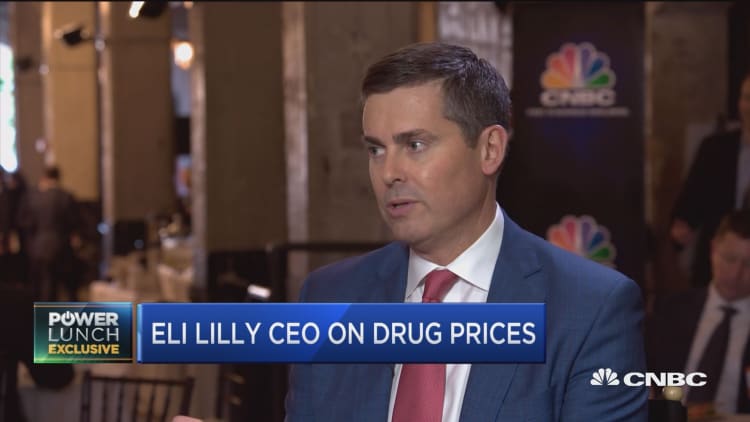
As prescription drug prices continue to soar, Eli Lilly and Company CEO David Ricks told CNBC that reducing the gap between list prices and what consumers pay is a "good idea."
"It's time for a change of the system," Ricks told CNBC's Meg Tirrell on "Power Lunch" Thursday.
"With the adoption of high-deductible plans, patients are subjected to the list price," said Ricks, who was in Minneapolis for the Piper Jaffray Heartland Summit, an annual health-care conference. "Really, they're paying the most. And in many cases, they have a chronic disease that won't be changed by the fact that they have to pay a lot or a little. They're just suffering."
Prescription drug prices are increasing at a rate of 10 times the cost of inflation, according to a government report released in March of this year.
Meanwhile, the battle over who benefits the most from rising drug prices continues.
While pharmaceutical companies and manufacturers often benefit from higher prices, so do pharmacy benefit managers.
Pharmacy benefit managers, or PBMs, act as middlemen between insurance companies and pharmacies, determining which pharmacies fall within a participant's plan and negotiating the prices of medicines within each plan. Manufacturers provide rebates to the pharmacy benefit managers in return.
Drug manufacturers say PBMs are benefiting from higher prices. PBMs, however, say manufacturers are at fault for setting higher prices in the first place.
Ricks said his company is "deeply bothered" by this system and that as list prices rise, Eli Lilly's net pricing has "basically" been flat since 2009.
"Where's all that money going in the middle?" he asked. "It's going to negotiators in the middle. But not to patients, who are increasingly subjected to the list price. And they have to make choices [about what to spend money on] that they shouldn't have to make."
In May, President Donald Trump unveiled a program that limits drug prices on some medications for Medicare users.
Under the Medicare Part D plan, some portion of the discount or rebate received from drug manufacturers has to be shared with patients.
In a speech, Trump chastised the middlemen who become "very, very rich" off the current health-care system, vowing that they "won't be so rich anymore."
The plan was praised by many, but it stopped short of allowing Medicare to work directly with manufacturers on pricing.
Ricks said reducing the pricing gap is "a better system and long term more stable for us as an innovator."
"This administration is moving the market in that direction," he said. "I think that's a good thing."


